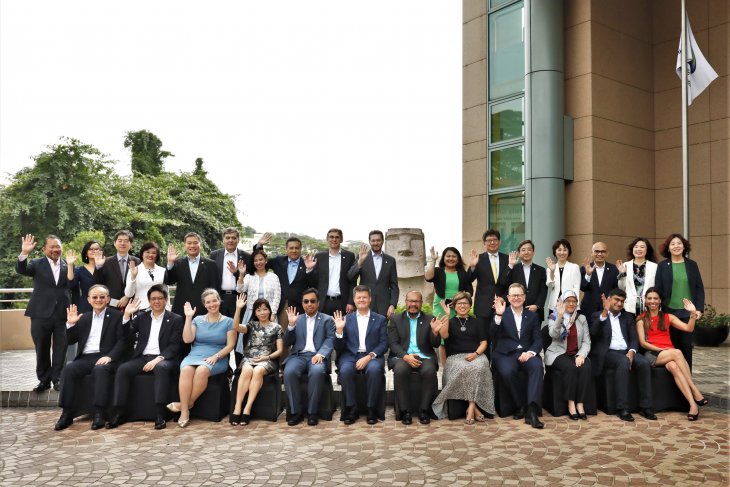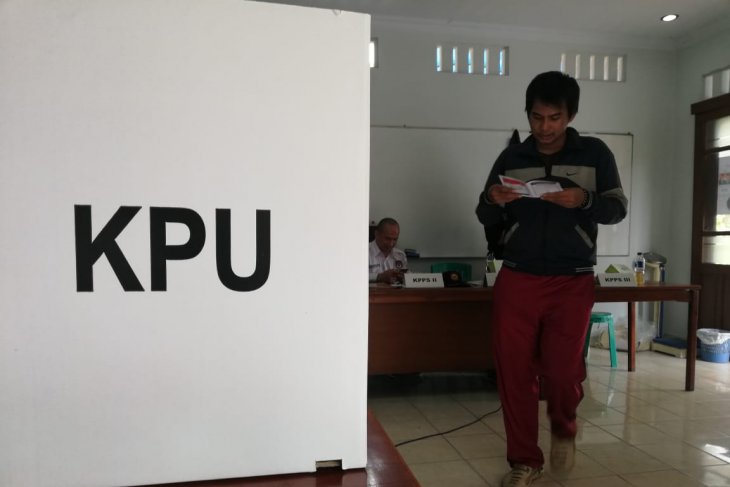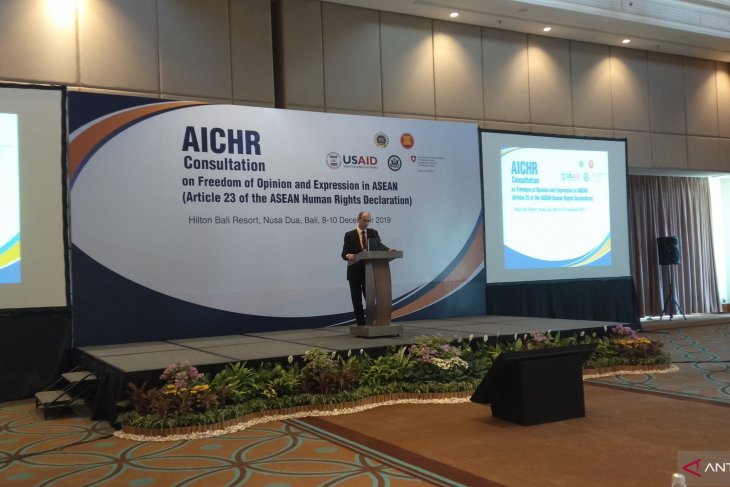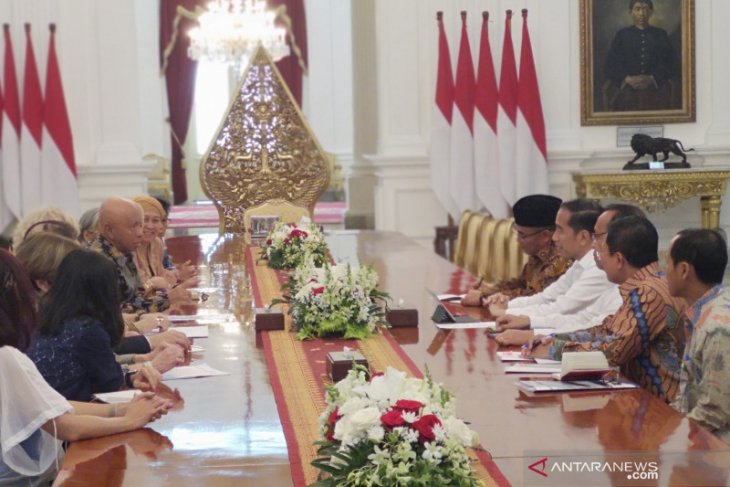Live Streaming
Program Highlight
Company Profile

Ani Hasanah
December

APEC Concluding Senior Officials’ Meeting held in Singapore on Saturday (December 7, 2019). (APEC Secreatriat)
Asia-Pacific Economic Cooperation (APEC) members will make concerted, sustained efforts in the path to achieving more inclusive and sustainable growth, APEC Senior Officials pledged at the concluding event for Chile’s host year of APEC.
At the APEC Concluding Senior Officials' Meeting, taking place at the forum’s Secretariat in Singapore, Chile put forth the three plans for collective action – or ‘roadmaps’ – that member economies agreed on during the year on key issues for regional prosperity.
These three plans pertain to the issues of women’s economic empowerment; marine debris; and illegal, unreported and unregulated fishing, according to a written statement issued by the APEC Secretariat and received Jakarta on Monday.
"The APEC enables our economies to foster and build consensus – and that’s critical for the region in times of challenges. At a time when the needs of our people are evolving, multilateral and regional fora, such as the APEC, can provide inclusive and sustainable solutions and create new opportunities for all our people,” 2019 Chair of APEC Senior Officials Mathias Francke remarked.
"Senior officials also focus on ways to deepen engagement with stakeholders," he stated.
Constituting 60 percent of the world’s gross domestic product (GDP) and half of the global trade, APEC’s 21 economies are vital to global economic growth.
The forum, marking three decades of cooperation, is one of the oldest and most resilient vehicles for economic collaboration and integration.
Francke noted that Chile’s host year was all about reverting to the essence of APEC -- or "back to basics" -- by promoting informal, open dialog between economies to advance complex issues. This approach enabled the forum to achieve important outcomes, including a consensus statement by the ministers responsible for trade.
Along with addressing the forum’s achievements and long-term vision, senior officials also pressed for action by the APEC Digital Economy Steering Group, formed earlier this year to spearhead the forum’s work on an increasingly critical sector.
A new APEC report on structural reform and the digital economy is also projected to serve as a guiding beacon for the region’s economies to garner greater benefits and better adapt to the fourth industrial revolution.
APEC Senior Officials also lauded the completion of the La Serena Roadmap for Women and Inclusive Growth that defines concrete goals and recommendations to reduce existing gaps between women and men in the Asia-Pacific. Chile is the first APEC economy to elevate women’s empowerment as a region-wide priority.
"To truly achieve inclusive growth, the APEC must ensure that everybody, including women and vulnerable groups, are able to fully participate in the economy and benefit from any progress. We thank Chile’s leadership in raising awareness on this pressing issue and vow to continue this important work," Rebecca Sta. Maria, executive director of the APEC Secretariat, stated.
Following the final meeting, led by Chile, APEC Senior Officials will convene in Langkawi, Malaysia, for the first events in the host economy for APEC 2020. (ANTARA)
December

Illustration - A voter exercises his political right at a pooling both in the 2019 simultaneous election.(ANTARA)
The House of Representatives (DPR) has agreed to a proposal on the revision of law on simultaneous general elections.
Chief of the DPR Commission II Ahmad Tanjung, in Jakarta on Sunday, highlighted the need to evaluate the implementation of the simultaneous general elections in 2019 owing to the several problems encountered.
"There may be a fundamental change in our general elections, particularly simultaneous elections, that must be evaluated," he stated.
He remarked that the DPR Commission II had agreed to revise Law No.7 of 2017 on General Election and Law No.10 of 2016 on Regional Head Election.
For the first time ever, over 190 million eligible Indonesian voters cast their ballots for the president and vice president as well as for members of the Regional Representative Council (DPD), DPR, and Provincial and District/Municipal Legislative Bodies (DPRD) on the same day on April 17, 2019.
In the 2024 general elections, voters will elect not only a president and legislators but also regional heads. "Let us see the developments first since our target is early 2021," he stated.
He noted that voters and election officers will encounter difficulties if the simultaneous elections, comprising the presidential election, legislative election, and regional head election, were to be organized in the same year.
"When the legislative election and presidential election were held simultaneously (this year), they claimed many lives. Moreover, if all the elections are held simultaneously, the number of victims may increase," he stated.
He strongly believes that no lives should be lost in the 2024 general elections.
He highlighted the need to conduct a comprehensive evaluation of the design of the 2024 general elections as well as academic and empiric reasoning. (ANTARA)
December

Swiss Ambassador to Indonesia Kurt Kunz addressed the ASEAN Intergovernmental Commission on Human Rights (AICHR) consultations in Nusa Dua, Bali, on Sunday (ANTARA)
The ASEAN Human Rights Declaration protects the freedom of opinion and expression of people in Southeast Asia, according to Swiss Ambassador to Indonesia Kurt Kunz.
"The freedom of opinion and expression is fundamental in a democracy," Kunz stated on the sidelines of the ASEAN Intergovernmental Commission on Human Rights (AICHR) consultations in Nusa Dua, Bali, on Sunday.
Clear legal rules or mechanism should be set out to safeguard the freedom of opinion and expression, he emphasized.
Kunz called for a mechanism to be put in place on rules and restrictions to which extent all can exercise the freedom of opinion and expression.
"Although everybody can express opinions freely, please do so in a responsible manner based on facts," he remarked.
Freedom of opinion and expression should not in any way hurt public sentiments, let alone tear the community apart, he cautioned.
"Everybody must express their opinions smartly without touching on the issue of ethnicity, religion, and race (SARA)," he stated.
Article 23 of the ASEAN Human Rights Declaration stipulates that every individual has the right to freedom of opinion and expression, including the freedom to defend opinion without interference and to seek, receive, and impart information, either verbally, in writing, or other way chosen by the person.
The Association of Southeast Asian Nations includes Brunei Darussalam, Cambodia, Indonesia, Laos, Malaysia, Myanmar, the Philippines, Singapore, Thailand, and Vietnam. (ANTARA)
December
President Welcomes World Stop TBC Action Delegation at Merdeka Palace

President Joko Widodo (Jokowi) received a delegation of the World Stop TBC Action at the Merdeka Palace in Jakarta on Monday. (ANTARA)
President Joko Widodo (Jokowi) received a delegation of the World Stop TBC Action at the Merdeka Palace in Jakarta on Monday.
At the meeting, Coordinating Minister for Human Development and Culture Muhadjir Effendy, Minister/State Secretary Pratikno, and Health Minister Terawan Agus Putranto accompanied President Jokowi, while the Stop TBC Action delegation was flanked by Chief of the Stop TB Partnership Forum for Indonesia (FSTP) Arifin Panigoro.
The global tuberculosis report published by the World Health Organization (WHO) showed that no single country is free from the disease.
In 2017, an estimated 842 thousand Indonesians had contracted TB caused by the mycobacterium tuberculosis, of which 23 thousand developed drug resistance to the disease.
Almost 75 percent of TB sufferers in Indonesia are from the productive age group.
The situation is a threat to fulfilling one of the agenda of the medium-term development plan 2020-2024 in which the country is striving to improve the quality and competitive edge of human resources.
TB is a global disease found in every country in the world. It is the leading infectious cause of death worldwide.
In 2018, an estimated 10 million people had contracted TB worldwide constituting 5.7 million men, 3.2 million women, and 1.1 million children. The cases transcended countries and age groups. (ANTARA)

